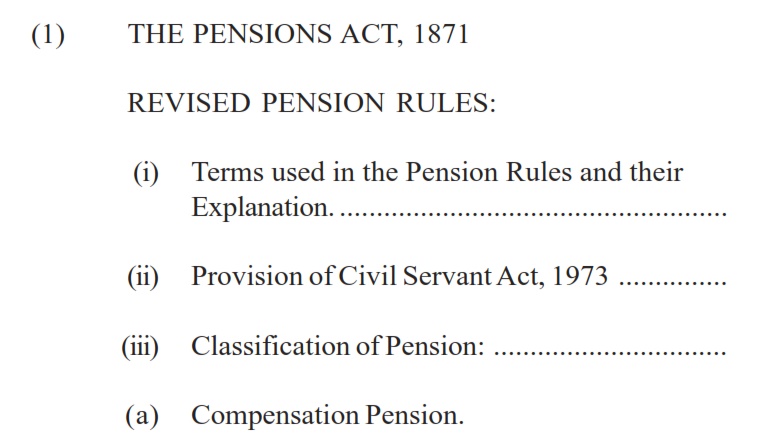If anyone searching the rules and regulations regarding family pension after death of husband working as civil servant in Pakistan.
Read More: Family Pension New Rules in Sindh Pakistan
(a) In the case of death of a civil servant while in service, gratuity in lieu of one-fourth of the gross pension will be allowed at existing rates. In addition, family pension shall be admissible for a period of 10 years at 50% of the gross pension.
(b) In the case of death within 10 years of retirement, family pension for the unexpired portion of 10 years at 50% of the pension (net, or gross, as the case may be) shall be admissible.
FAMILY PENSION IN EXISTENCE ON 1-3-1972
If a family pension in existence on 1st March, 1972, related to a civil servant who had died while in service, the total period of the admissibility of family pension will be ten years instead of five years.
If a family pension in existence on 1st March, 1972, related to a civil servant who had died within five years of his retirement, the total period of admissibility of the family pension in such a case shall be the unexpired portion of ten years instead of five years.
The amounts of family pensions in either case shall remain the same as on 1st March, 1972.
Family pensions in existence on 1st March, 1972.—Are the arrears payable to cover the period beyond 5 years?
As the life of the family pension has been extended from 5 to 10 years, it is evident that, in all cases where the period of 5 years terminated on or after 1st March, 1972, the arrears will be payable to cover the remaining period beyond five years. The amount of pension would, of course, remain unchanged.
Read More: Family Pension to Widower After Death of Female Govt Employee
In para 6 of the Finance Division Office Memorandum No. F. 6(1)Rev.1/75, dated the 7th January, 1977, it has been provided inter alia that, in the case of death of a civil servant while in service, family pension shall be admissible for a period of *ten years; in the case of his death within ten years of retirement, the
family pension shall be admissible for the unexpired portion of ten years.
The same benefits have been provided in respect of;
(i) a pensioner who retired before 1st March, 1972, and whose demise occurs or occurred on or after that date and
(ii) family pensions in existence on 1st March, 1972, vide paras 9 and 10 thereof. In other words, only the life of the family pension has been extended from five to ten years but the other conditions have remained unchanged.
However, an impression seems to prevail in some quarters that, under para 10 mentioned below, a family pension in case of death after retirement can perhaps be admissible for full ten years instead of the unexpired portion of ten years. This impression is not correct.
Therefore, in order to remove any chances of the provisions being misinterpreted, it has been decided to substitute ab initio the existing para 10 of Finance Division Office Memorandum of 7th January, 1977, by the following para.
Read More: Pension Guidelines Book 2020 Urdu
If a family pension in existence on 1st March, 1972, related to a civil servant who had died while in service, the total period of the admissibility of family pension will be ten years instead of five years. If a family pension in existence on 1st March, 1972, related to a civil servant who had died within five years of his retirement, the total period of admissibility of the family pension in such a case shall be the unexpired portion of ten years instead of five years. The amounts of family pensions in either case shall remain the same as on 1st March,1972″.
Supplementary Instruction:- A question has been raised as to what procedure should be followed for making payment of pension or shares of gratuity admissible to minor children of deceased Government servant or family pension when payable to a minor child. The President has been pleased to direct that when the beneficiary is a minor and has no regularly appointed Manager or Guardian, the sanctioning authority may allow the payment of pension or shares of gratuity of minor children of a deceased Government servant to their mother. In case the mother is not alive or was judicially separated from the Government servant in his life time, the sanctioning authority may nominate any suitable person to be the guardian of such minor children for the purpose of receiving payment of pension and/or shares of gratuity on their behalf.
Read More: EOBI Employees Old-Age Benefits 2020
When the Government servant leaves no family the amount of gratuity shall be payable to the following surviving relatives, if any, of the Government servant in equal shares:-
(a) Mother
(b) father
(c) Un-married sisters below the age of 21 years and widowed sisters; and
(d) brothers below the age of 21 years
Note:- Judicially separated or divorced mother who has re-married does not fall in this category.
No gratuity will be payable by Government after the death of a Government servant if he/she does not leave a family as defined in para 5(1) above or an eligible dependent relative or relatives specified in sub-para (2) of paragraph 2 above.
(1) Family for the purpose of payment of pension at 50 per cent of gross or net pension as the case may be under para 6(a) or para 6(b) of this Division O.M. No. F. 6(1) Rev. 1/75, dated 7-1-77 will be as defined in para 5(1) above. It will also include the Government servant’s relatives mentioned in sub-para (2) of
paragraph 2 above.
(2) (a) A pension sanctioned under this Section will be allowed to:-
(i) Widow of the deceased for her life, if the deceased is a male Government servant. If the Government servant had more than one wife, and the number of his surviving widows and children does not exceed 4, the pension shall be divided equally among the surviving widows for life and children. If the number of surviving widows and children together is more than four, the pension shall be divided in the following manner, viz. each surviving widow shall get 1/4th of the pension and the balance if any shall be divided equally among the surviving children. For the purpose of this cause, the term “Children” exclude sons above the age of 21 years, married daughters and daughters above the age of 21 years.
(ii) failing a widow or husband, as the case may be, to the eldest surviving son for 10 years or un-expired portion of 10 years excluding sons above the age of 21 years;
(iii) failing (i) and (ii) to the eldest surving unmarried daughter *[till her marriage]; if the eldest daughter marries or dies then the next eldest *[daughter till her marriage].
(iv) failing (i) to (iii) to the eldest widowed daughter for 10 years or unexpired portion of 10 years.
(v) failing (i) to (iv) to the eldest widow of a deceased son of the Government servant for 10 years or un-expired portion of 10 years.
(b) If the event of no pension being payable under clause (a) the family pension may be granted for a period of 10 years or un-expired portion of 10 years:-
(i) to the father;
(ii) failing the father to the mother;
(iii) failing the father and the mother to the eldest surviving brother below the age of 21;
(iv) *“[failing (i) to (iii) to the eldest surviving un-married sister for life or till her marriage, if the eldest un-married sister marries or dies the next eldest un-married sister for life or till her marriage].
(v) failing (i) to (iv) to the eldest surviving widowed sister for 10 years or un-expired portion of 10 years.

